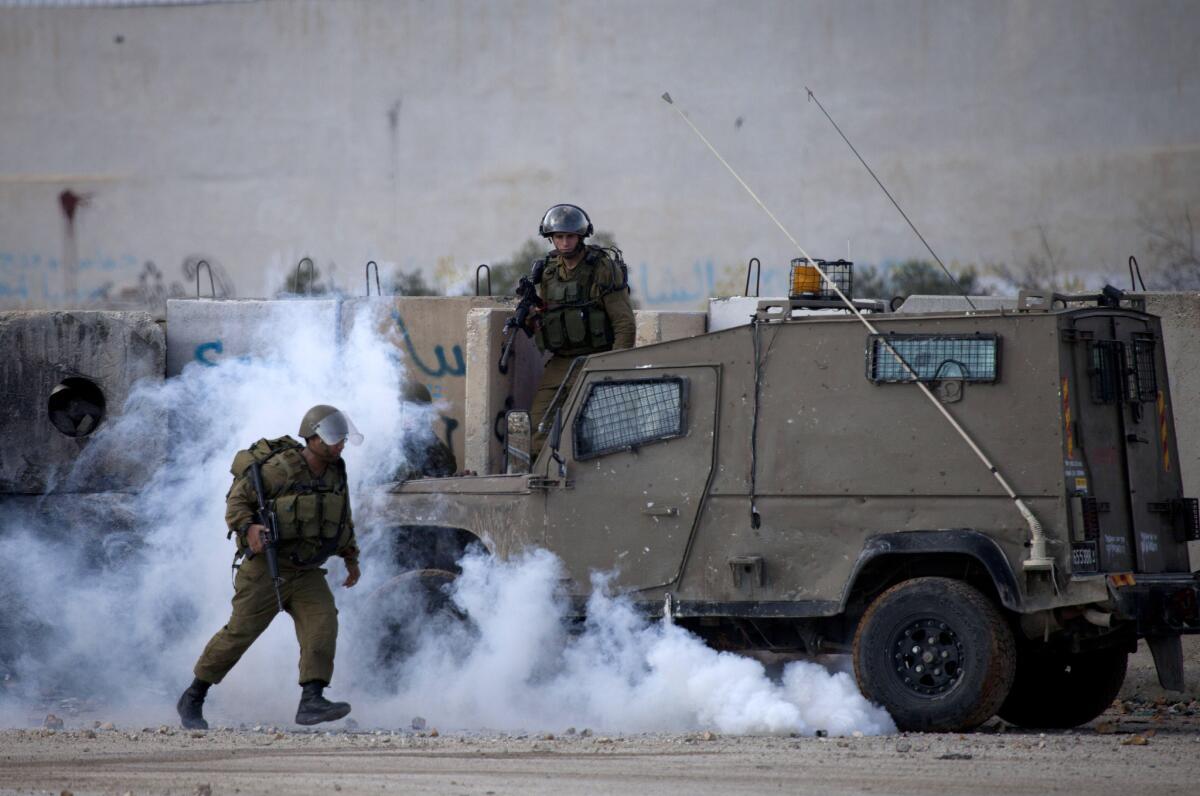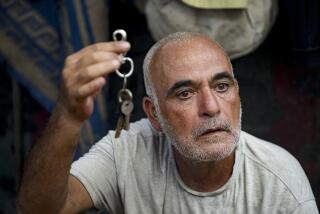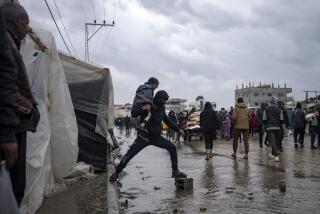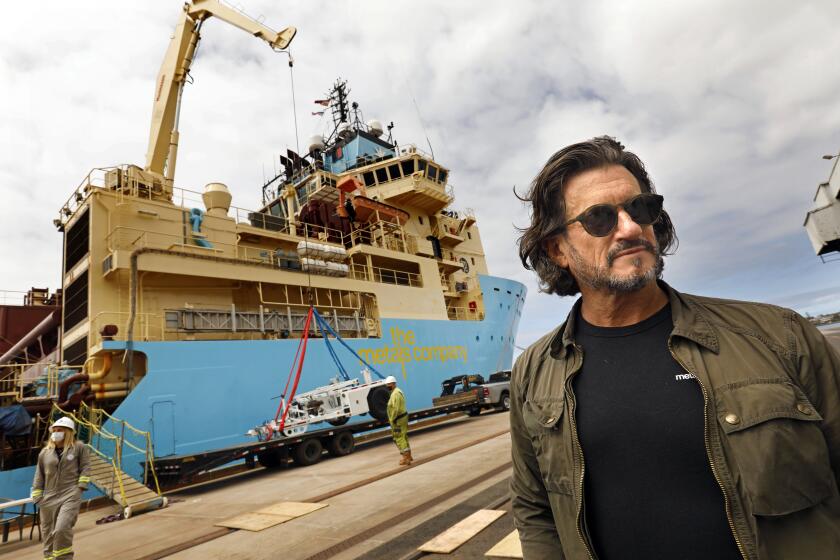Israeli demolition of Palestinian home follows synagogue attack

A thunderous explosion and the crunch of collapsing masonry early Wednesday heralded the revival of what had been a largely abandoned Israeli tactic: the demolition of family homes of Palestinians who stage attacks against Jews.
Less than 24 hours after four religious scholars were killed while at prayer in a Jerusalem synagogue, and a police officer was fatally wounded while trying to thwart the attackers, Israeli forces before dawn surrounded a four-story building in the Silwan neighborhood of predominantly Arab East Jerusalem. They evicted those inside and methodically rigged the structure with explosives, sending a blast reverberating across the valley and leaving the building standing but uninhabitable.
The demolished home did not belong to one of the synagogue attackers; some of its residents were relatives of a man who nearly a month earlier drove a car into a crowd waiting at a Jerusalem tram stop, killing an Israeli 3-month-old girl with American citizenship and a 22-year-old woman who was hoping to immigrate to Israel from Ecuador.
But the demolition carried an unmistakable message: After the carnage at the synagogue in the devout West Jerusalem neighborhood of Har Nof, Prime Minister Benjamin Netanyahu had vowed that destroying homes would be one of the principal countermeasures wielded by Israel. The killers in Tuesday’s attack died, but their families, he said grimly, could expect to pay the price.
“We will not accept this reality,” said Netanyahu, who also ordered measures such as increased gun permits for Israeli Jews, checkpoints at the entrances to Arab neighborhoods in Jerusalem and more guards in public places.
Home demolitions, roundly despised by Palestinians, were strongly condemned by the international community and human rights groups when the practice was most widely in use, more than a decade ago. The United Nations and others described it as an unfair form of collective punishment.
Demolishing Palestinian homes as a punishment, deterrent or both dates to Israel’s capture of the West Bank and Gaza Strip in the 1967 Middle East War. The practice reached its height during the second Palestinian intifada, when about 700 Palestinian families — about 4,000 people — were left homeless between the autumn of 2000 and early 2005, according to the Israeli rights group B’Tselem.
To some, the tactic raises moral issues. In Israel, though, the tenor of the debate is somewhat different, centering on the question of whether home demolitions are a true deterrent against attacks.
During the intifada, Israel’s security establishment harbored differing schools of thought on whether knowing that their families would be made homeless gave attackers pause or merely served to radicalize those left behind — younger brothers, cousins, neighbors.
“The demolition of houses is a controversial topic,” commentator Alon Ben-David wrote in Wednesday’s editions of the newspaper Maariv. He said the Israeli military’s assessment was that demolitions were not effective, but that officials from the domestic intelligence service Shin Bet “could tell you about the dozens of fathers who handed over their terrorist sons in order to keep their houses whole.”
Others said demolitions were one of the few weapons in a frustratingly scant Israeli arsenal against the current wave of attacks, which security officials believe are inspired by anti-Israeli incitement but have not been carried out with training and support provided by any particular militant faction. Before the synagogue attack, six people had been killed in the last month, run down with cars or stabbed by Palestinian assailants.
“I have no doubt these [home demolitions] must be done, otherwise these attacks will happen again and again,” analyst Uzi Rabi told Israel Radio. “But this is the micro level. This must be accompanied by an overall strategic approach to counter the motivation of ordinary people who go to sleep at night and wake up with the decision to carry out attacks such as yesterday’s.”
The Israeli military said in a tweet early Wednesday that “demolishing terrorists’ homes sends a sharp message to anyone targeting civilians or members of the security forces: terror and hurting innocent people carries a heavy price that will be paid by those who choose to continue this path.”
But after the demolition in Silwan, the family of Abd Rahman Shaludi, the 20-year-old whose vehicle careened into a crowd at a light-rail stop Oct. 22, telegraphed defiance. The family has said Shaludi, who left the scene on foot and died after being shot by a police officer, lost control of the vehicle and did not intend to hit the crowd.
“Israel thinks if they demolish our homes, they are going to prevent these acts,” the family matriarch, Inas Shaludi, was quoted as saying by Palestinian media. “But what they do not know is that violence brings more violence.”
The demolition left chunks of rubble scattered over a wide area and littered the ground with broken glass. Palestinians said the building contained six apartments, with Shaludi’s family occupying only the fourth floor.
Although the blast left the structure’s columns standing, lower-floor apartments belonging to other families were largely wrecked as well — walls were cracked, windows blown out and ceilings damaged — as were cars parked nearby, Palestinian witnesses said.
Spurred in part by the demolition, stone-throwing Palestinians clashed with police in Silwan and several other neighborhoods in the city’s eastern sector. Demonstrators, some of them masked and many of them teens or younger, hurled stones and set tires ablaze, fleeing when police gave chase.
Amid widespread condemnation of the synagogue attack, the neighborhood of Har Nof was wrapped in mourning. All four of the slain worshipers were respected as rabbis, or learned men, in their ultra-Orthodox tradition; they lived on the same street, and they left 24 children among them. Three of the four men held U.S. citizenship.
On Wednesday, as a gesture of remembrance and resilience, morning prayers, which had been interrupted by the assault the day before, were held as usual in the synagogue. Shattered glass had been swept up and bloodstains scrubbed, though bullet holes remained and a notice read, “Death has come to our window.”
Even a circumcision, a key rite of passage in this pious community, went ahead as planned.
“I’m not afraid,” one congregant told Israel radio. “Prayer always helps.”
The police officer who died overnight of his wounds, a member of Israel’s Druze minority, was buried Wednesday, drawing mourners from the disparate communities of the Druze faith, an offshoot of Islam, and ultra-Orthodox Jews. Har Nof religious leaders urged a show of gratitude to one who was killed while trying to halt the synagogue carnage.
The 30-year-old officer, Zidan Sif, left a wife and 4-month-old daughter.
Special correspondents Batsheva Sobelman in Jerusalem and Maher Abukhater in Ramallah, West Bank, contributed to this report.
Twitter: @laurakingLAT
More to Read
Sign up for Essential California
The most important California stories and recommendations in your inbox every morning.
You may occasionally receive promotional content from the Los Angeles Times.





